Army Vietnam War Oswego, IL Flight date: 05/15/24
By Charlie Souhrada, Honor Flight Chicago Veteran Interview Volunteer
Robert “Bob” Gatenby’s wife and family thought he was comfortably stationed in a base camp during his time in Vietnam. His reality, however, was the exact opposite.
Bob was born and raised in Aurora. His dad, Robert, held an office job at McKee Door Company, also in Aurora, while his mother, Mary, raised Bob and his older brothers and one sister. “I was the baby of the family, and I got all kinds of special privileges,” he says with a grin. “’Bob, you do this…’ ‘Bob you do that…’ Everybody was the boss, and I was their pawn!”
Bob may have been the baby, but he started everything else early. He took his first job at 11-years-old delivering newspapers for the Aurora Beacon News. At 15-years-old, he got a job at the local Pepsi Cola bottling plant washing and loading bottles.
He wasted no time with relationships either and started dating his wife, Diane, at age 14, after meeting her at Lebanon Park in Aurora. “I used to hang out there all day, every day,” he says. “One day, I stole her bike just to talk to her. She was pretty then; she’s prettier now!”
After graduating from East Aurora High School in 1966, when he was 17 years old, Bob worked in the storeroom at Western Electric in Montgomery for 10 months, then followed an uncle’s recommendation and took a higher paying job with Allied Moving Company.
At 18, Bob figured he would get drafted right away, but he didn’t. “I was working at Commonwealth Edison thinking ‘maybe they’re not going to call me!” he says. Instead of making a military commitment, Bob committed his life to Diane. “I’d been asking her to marry me and finally she came down to the house one night and said, ‘my mom said if we really want to, we can get married.’” The couple married in August 1968 and settled into an apartment. As luck would have it, less than six months later, Bob’s draft notice arrived in the mail. “I came home from work, heard her crying in the bedroom, and there was a letter on the table. I knew exactly what it was.”
The draft notice forced the couple to put their plans on hold. They put most of their newly purchased furniture in storage, Diane moved in with her mother and father, and in February 1969, Bob left for basic training at Fort Leonard Wood, Missouri.
“Basic was hard,” he admits. “It was the first time this small-town boy had ever been out of state!” During eight weeks of basic, Bob lived in “dorm-style” barracks with eight guys in a room. After basic, Bob was sent to Fort Ord, near Monterey, California, where he took advanced infantry training (AIT) to serve as an 11B military occupational specialty – infantryman.
In July 1969, after taking several weeks for a visit back home, he flew a series of commercial flights, refueling in Hawaii and Guam, and arrived at Tan Son Nhut Air base in Vietnam. “It was hot, and I was scared,” he remembers. “Immediately, I could see a difference between the soldiers who had seen combat and the FNG’s.”
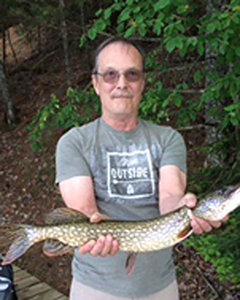
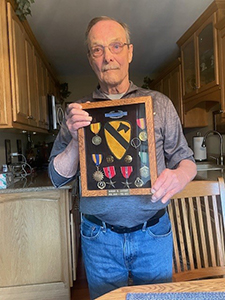
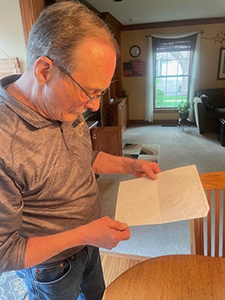
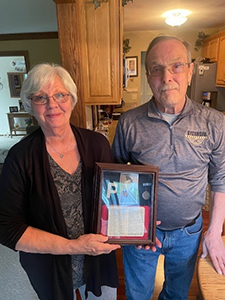
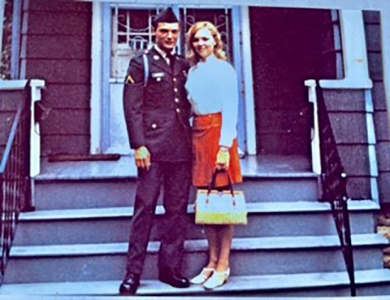
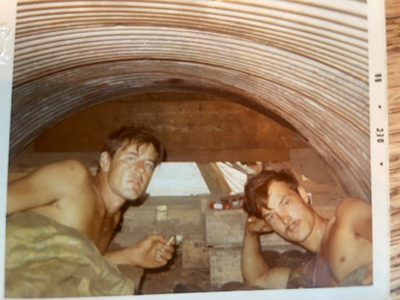
In Vietnam, Bob served in a squad that conducted search and destroy missions along the Ho Chi Minh trail, a fact that his family never knew. “My brother, Rod, had just been to Vietnam one year before,” he says. “I saw what it did to my mom, so the whole time that I was there, I never told anybody I was out in the field. I didn’t want to scare my wife or my mother. I told them everything was fine. I’m on the base camp. It’s beautiful here, I get hot meals, I get showers.” His reality, however, was the exact opposite.
There, Bob was part of a platoon comprising four, four-man squads. They’d spend 30 days patrolling the jungle, which meant sleeping for three hours at a time, waking up and doing guard duty for one hour, and then doing it all over again. “I slept in swamps where you put your pack up against a tree and sleep with the water coming up around you,” he remembers. “In the wooded areas there’d be termites, red ants, and rats. In the swamps, you always bloused your pants, but the leeches would still get in. During the night you could feel them crawling up your legs.”
Bob remembers one commanding officer who loved looking for bunker complexes along the trail, which the Viet Cong used to transport troops and supplies through the thick jungle into South Vietnam, Cambodia, and Laos. “The trail was a dirt path, sometimes no wider than a sidewalk,” he remembers. “They set up bunker complexes with food, supplies, medicine, along the sides of the trail and protected those complexes. One day, we came across a section of the trail with a bamboo sidewalk and down the sides were all these trees hallowed out with lanterns in them, so they moved their stuff at night. I knew that if this part of the trail was that well-constructed, it’s well used. That was scary to see.”
One night, in September 1969, Bob’s platoon had set up their night defenses. During the night, a battalion of North Vietnamese fighters walked right by. “I swear to God my heart was beating so loud that I was seriously afraid they could hear my heartbeat. That was one scary night. We didn’t get any sleep that night.”
Through it all, Bob kept his wits about him by talking about cars, food and singing Beach Boys songs with his best friend, Larry Hubbard. “I named my daughter after his wife,” he says.
When he had the chance to communicate with the folks back home, he requested “care packages” and Diane and his mother responded enthusiastically. When the packages arrived, however, Bob would have to carry his goodies with him through the jungle. “I would tell them, ‘Send me some care packages’. They sent so much stuff that I had to give it away.” Packages of Kool-Aid were highly prized because the troops would use them to flavor bomb crater water for drinking to make it less disgusting. He explains that during firefights, troops would go through their water in no time but couldn’t get resupplied. “We’d take water out of the bomb craters and drink it instead.”
Every 30 days, Bob’s platoon would go back to a fire base for a week. “When we came in, another would leave to take our place.” There he got clean clothes, a shower, and a warm meal. “This wasn’t a place to relax,” he explains. Once every two or three months, the platoon would take a three day stand down at a company base camp where they enjoyed cold beer. “We’d get beer sent to us out in field, but the temperature was 99 degrees that meant the beer was 99 degrees. Cold beer was something else!”
In March 1970, a rocket propelled grenade blew up in front of him and a sliver of bamboo stuck in his forehead like an arrow. “I had to pull that out and it started to swell,” he says. The wound occurred shortly before his only R & R trip – a visit to Hawaii where he planned to reunite with Diane – and almost revealed the dangerous life he was leading in Vietnam. “When I got to Hawaii, I told her I bumped my head on the airplane. The bump didn’t go down the whole week!” “Lies, lies, lies,” Diane says.
When Bob returned from RnR, he was offered two choices – go back to his company in the field or stay behind in Alpha Company headquarters as part of the colonel’s guard. If he stayed, he’d remain an SPC4, but if he went back to the field, he’d get promoted to a sergeant. “I said there’s no way. There’s not enough money in being a sergeant. It’s just not worth it.” Bob chose to stay back and guarded the Colonel’s helicopter and bunker for about three months before getting his orders to go back to the US in July 1970. “You knew when it was time to go home,” he says. “You’re counting the days.”
He landed in Oakland, received a new uniform, the medals he had earned, and boarded a bus to San Francisco Airport. “Just walking through the airport was the most disappointing, hateful period I have ever lived through,” he remembers. Back home, O’Hare Airport wasn’t any better.
Eventually, he enjoyed being home in Aurora for one month, then Bob and Diane packed up and moved to Fort Riley, Kansas. There, he was told they didn’t have room for him. Instead, he was sent to Fort Carson, near Colorado Springs. In February 1971, after six months in Colorado, Bob’s time in the Army was complete. The couple returned to Aurora, and Bob rejoined Commonwealth Edison as a meter reader, eventually moving to management as a senior customer service supervisor, thanks to a lot of hard work and a diploma he earned from Waubonsee Community College.
Over the years, Bob and Diane welcomed two children – Erika and Todd – and moved to Oswego in 1977 and into the home where they still live.
In 2002, when Bob was 53 years old, he retired from Commonwealth Edison. He now spends his time doing “whatever the hell I want to,” which includes wood working, traveling with Diane, and doting on his six grandchildren. “They’re my everything,” he says.
Welcome home, Bob, and thank you for your service. We hope you enjoy your Honor Flight!


